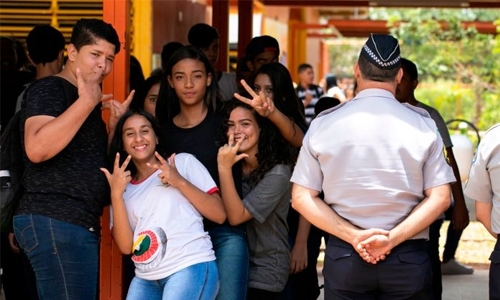Pupils learn military discipline in Brazil school
It was the beginning of a new school year and the group of 13- and 14-year-olds listened with a mixture of surprise and curiosity as the sergeant told them the rules have changed. From now on, it’s military discipline all the way, Sergeant Nunes told them. They will enter into classrooms single file -- hair short for the boys, a bun for the girls, he said. Their school, the CED 07 educational center on the outskirts of Brasilia, is one of four public schools -- 7,000 students in all -- that are being transformed into military-run schools.
President Jair Bolsonaro, a former paratrooper, promised to establish more of these state-run military secondary schools during his election campaign last year. By the end of the year, there should be around 40 of the new military schools, a spokesman for the Federal District’s education secretariat, Mauro Oliveira, told AFP. “We are here to empower the teachers,” Captain Newton Araujo, a military police officer in impeccable blue uniform, says as he watches his subordinates instruct the pupils in the new school regime. “We are here as collaborators, not usurpers,” he said, using distinctly military jargon.
Military police have been put in charge of discipline and administrative functions, while lessons are given by civilian teachers. Sergeant Nunes explains to a boy how short his hair must be cut with electric trimmers to comply with the new rules. “Setting two for the sides, four for the back,” he says. Over the coming months, the students will make other changes. They will wear uniforms, with girls permitted only “very moderate” accessories. They will stand, each day, for the national anthem. They will receive civics classes.
“Through the principles of military culture we are going to apply rules of civility, patriotism, citizenship, ethics,” said Newton. The schools were chosen for the pilot program in part because they are in poor, high-crime districts, Newton said. They aren’t the first of their kind in Brazil. There are 120 other state schools that have been operating along military lines for years, half of them in the state of Goias near the capital. But the initiative has divided educators and outraged some.
Carla Alcantara Souza, a teacher and the daughter of a military man herself, is adamantly opposed to the model being “forced” on CED 07. “I am extremely worried when our disciplinary director says that people who do not adapt to this model can leave. For an educator, to hear that ‘if you don’t fall in line, you can go,’ it’s painful,” she said, surrounded by schoolyard noise. She also fears that students’ sense of identity would be warped by the experience.
Related Posts

